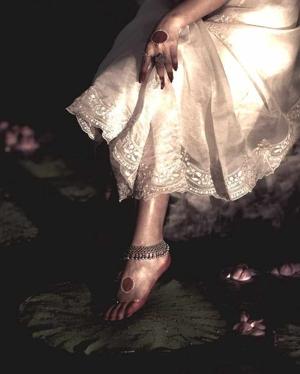
Sanyogita’s POV
Five days.
Five endless, solitary days had passed since I arrived in Yakshoti Valley. I had no memory of my past, no recollection of where I came from. The river, the mountains, the breeze—everything here felt like a waiting room. A place that felt both familiar and alien, as if I had always been here, yet at the same time, I never belonged.
I had taken shelter in a small cottage on the edge of the village, far from their curious eyes. The villagers rarely spoke to me, and I preferred it that way. My mind swirled with whispers I couldn't understand. There was something inside me—something dark, something wild. I felt as though the world around me had forgotten me, and I had forgotten myself. But every time I closed my eyes, something in the shadows would stir, like a memory I could never reach.
The cottage was modest but mine. A small stone house with a thatched roof and a few broken windows. There was a fire pit outside that I rarely used, except to cook the few herbs and vegetables I could gather. A bed, a wooden table, and a few tools to carve the occasional trinket or wood carving to pass the time. It was simple, and in that simplicity, I found a strange sense of peace.
But peace was fleeting.
The river behind my cottage was my constant companion. It was cold and clear, flowing endlessly as if time meant nothing to it. Sometimes, I would sit by the river, letting the current lap against my bare feet, my thoughts wandering in endless circles, searching for something that would give me a sense of purpose. But every time I stared into the water, I felt the gnawing hunger of something missing.
It wasn’t until the afternoon of the fifth day that the stillness was broken.
I was walking along the riverbank, my bare feet sinking into the soft, damp earth, when I saw them. A group of men, their faces twisted in malice, approaching the village. At first, I thought little of it, until I saw the way they looked at me. It was not a glance of curiosity, but one of hunger—dark, possessive hunger. They had come for me, and I knew it the moment they laid their eyes on me.
They were goons. I could see it in the way they moved, the way their hands were always close to their weapons. They were used to violence, and I could sense that they meant to take what they wanted, no matter the cost.
I wasn’t afraid. I wasn’t even nervous. There was only a cold, numbing certainty that coursed through my veins.
They came closer, their words laced with crude promises. The first one reached for me, his hand gripping my arm with force. I didn’t scream. I didn’t struggle. I let the silence fill me, let the rage simmer beneath the surface.
And then, without thinking, I acted.
I grabbed the nearest stick, using it as a makeshift weapon. The first man fell to the ground with a loud crash as I struck him in the face, my strength surprising even me. The others hesitated, but only for a moment.
They were not afraid. But I was different. There was a hunger inside me that I couldn’t control, a primal force that roared to life. The next moment, I had a blade in my hand—a crude, jagged thing I’d found in the woods a few days ago. I didn’t remember how I got it, but it felt as if it had always belonged to me. My hands, trembling at first, soon grew steady as I advanced on the men. The blood spilled easily, flowing over the dirt like a dark river of its own.
I felt alive. Truly, utterly alive.
The first man to fall was the one who had grabbed me. His blood stained the ground, his life slipping away in front of my eyes. But I didn’t feel remorse. I didn’t feel pity. I felt… power.
The second man was faster, but not faster than me. I disarmed him with a swift motion, the blade cutting through the air, leaving nothing but the sound of a body hitting the ground. His scream echoed in the valley, but it was drowned out by the pounding of my heart in my chest.
And then, there were only two left.
The hunger in me was insatiable, a beast clawing at my insides. I wanted to see the blood. I wanted to see them suffer.
Why? Why does it feel so right? I couldn’t answer that. All I knew was that the blood had made me feel alive, had made me feel whole. It was as if a part of me had woken up after so long, something I couldn’t explain, but something that would never go away.
The villagers had watched from a distance, their faces pale, their hands shaking. They didn’t know me, not truly. They only saw a woman who killed in cold blood, a woman who seemed too fierce for their peaceful existence.
And they were afraid of me.
But then, before I could turn on the last two, the sound of hooves broke through the tension.
A rider approached—a commander, I guessed, by the way he carried himself, the way he sat tall in the saddle, his eyes scanning the area like a hawk. He saw me, standing there, covered in blood, the remains of the men at my feet.
He didn’t flinch. He didn’t even blink. His eyes were calculating, and for a moment, I wondered if he was judging me. But then, his voice broke the silence.
“What is this?” he asked, his tone firm but not cruel.
I didn’t answer right away. I couldn’t.
The villagers, sensing the shift in power, slowly backed away. They had seen enough. They feared me now.
“I was defending the village,” I finally said, my voice hoarse. “These men came to hurt the people here. I stopped them.”
The commander’s gaze never wavered. “By killing them.”
“They tried to harm me,” I said. “They would have killed me if I had let them.”
“And you think this is the way?” he asked, his voice low. There was something in his eyes, something that made me hesitate for a moment. “Killing without mercy?”
“They would have killed me without mercy,” I replied, my voice barely above a whisper. “What else was I supposed to do?”
He dismounted, his boots hitting the ground with a quiet thud. “You’re not like the others, are you?” His eyes seemed to pierce me, as if searching for something buried deep inside me.
I didn’t answer. What was there to say?
The commander took a step toward me, his expression softening. “You’ll need to come with me.”
“Where?” I asked, my voice rising. “To the village to face their judgment?”
“No,” he said, shaking his head. “To the palace. Maharaja Pratap will want to see you. He’ll want to understand what’s going on here.”
I stiffened. The name Pratap struck me like a hammer. But I didn’t say anything.
I didn’t know what I expected when I agreed to follow him, but I certainly didn’t expect the overwhelming sense of fear that washed over me as we rode toward the palace. Something about this place—this empire—called to me in ways I couldn’t explain.
It had only been two years since I had met the sage who had raised me. My foster father. He had taken me in when I had no memory of my past, raising me as his own. I only remembered the last two years, nothing more. The few flashes of my previous life—the flashes of a different identity—did not make sense to me. My foster father had often spoken of penance, of his pilgrimage to the Himalayas for greater peace and understanding.
He had left only a few months ago, in search of enlightenment, leaving me alone in the world with only the memories of the past two years to cling to. I had no one. And now, I felt the name Pratap bringing a sense of deep relief to my mind.
As we neared the gates of the Nirjara Empire, I caught sight of the grand structures towering ahead. The palace loomed in the distance, its grandeur impossible to ignore.
And somewhere deep inside me, the question lingered: What is waiting for me there?


Write a comment ...